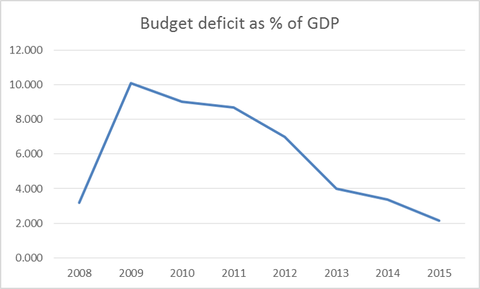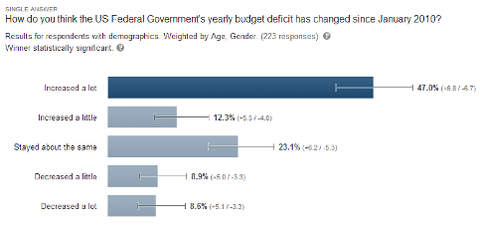As London continues to suffer with perfect weather this weekend, I'm taking a moment to get in from the cool sunny breezes and small cumulus clouds obscuring almost 10% of the sky. Yesterday the temperature soared to an unimaginable 24°C, causing Londoners to seek solace by standing outside pubs in groups drinking lagers. Today things have cooled off to more realistic levels (19°C right now), but the sun continues to make Londoners miserable and wait the restoration of normal weather.
Anyway, I've been meaning to post this map, which shows the U.S. population by race—one dot per person. Here's Chicago:

The yellow area south and west of the Loop are mostly African-Americans; you can see the abrupt change where the Austin neighborhood meets Oak Park on the west side. White people are blue dots, so purple-ish areas are well-integrated, while bluer areas are not.
Other parts of the country have different stories. Play with the map and take a look.
The IRS has (correctly, I believe) ruled that legally-married couples get to file joint returns. All legally-married couples:
All legally married same-sex couples will now be recognized for U.S. federal tax purposes the same way as their heterosexual counterparts, the Obama administration said on Thursday.
As expected after a landmark Supreme Court ruling in June, the U.S. Treasury and Internal Revenue Service said:
“The ruling applies regardless of whether the couple lives in a jurisdiction that recognizes same-sex marriage or a jurisdiction that does not recognize same-sex marriage.”
I believe there was no other possible result under the Internal Revenue Code now that DOMA is dead, but I'm glad that the IRS saw fit to underscore the point.
Former law professor Barack Obama makes the case:
“This is probably controversial to say, but what the heck, I’m in my second term so I can say it,” Obama said during a stop at the State University of New York at Binghamton. “I believe, for example, that law schools would probably be wise to think about being two years instead of three years because [….] in the first two years young people are learning in the classroom.”
In the third year, he said, “they’d be better off clerking or practicing in a firm, even if they weren’t getting paid that much. But that step alone would reduce the cost for the student.”
He continued: “Now, the question is, ‘Can law schools maintain quality and keep good professors and sustain themselves without that third year?’ My suspicion is, is that if they thought creatively about it, they probably could.”
The remarks apparently were made off-the-cuff, and no further details were available from the White House. But experts said the notion – although not new itself, as American law schools were two-year endeavors through the 19th century – is gaining traction.
Wow, I wish there had been a two-year plan when I was a law student. For one thing, 1998 would have been a lot more fun for me. I found some of my third-year courses interesting, and in a couple of cases (Wills, Copyright) genuinely useful. But I'd already decided by third year that I had no intention of practicing.
If I'd actually wanted to practice law after earning my JD, then my third year would have been worse than useless. I may have made other choices—clinics instead of content courses, for example—but I'd still have spent a lot of money without gaining a lot of practical experience.
Last week the Justice Department and several states, including Texas and Florida, sued to stop the American—US Airways merger. Today a couple of them realized their error:
Political and business officials in Florida, Texas and North Carolina are asking the U.S. to reconsider its suit to block the proposed merger of American Airlines and U.S. Airways, saying the combined company would benefit their local economies.
Florida, Texas and North Carolina...are home to large hubs for both airlines.
American Airlines, which sought Chapter 11 protection in late 2011, is one of the largest private employers in Miami-Dade County. The carrier operates around 70 percent of the flights at the Miami airport, making it a dominant hub for flights to and from Latin America. Local officials have long promoted Miami as the “Gateway to the Americas.”
Yeah, I didn't understand that four of the six states who joined the Justice Department suits (these three plus Arizona) contain four of the five largest hubs of the two airlines—including the airlines' headquarters (American in Texas and US Airways in Arizona).
Even though I thought there would be a challenge to the merger, after I thought about how the challenge actually went down, it didn't make any sense. Obviously the people who depend on American and US Airways for their livelihoods agree.
Chicago has recently rolled out a several hundred DIVVY bike sharing stations, similar to the Citi Bike scheme in New York. For a small annual fee, or a moderate per-hour charge, you can take a bike from any DIVVY bike station and ride it to any other station within two hours. (The two-hour time limit keeps the bikes in circulation.) The city has a hundred or so stations now, with a couple thousand bikes.
Of course, not everyone is happy about the bikes, which help cut pollution, reduce traffic and noise, and are greenhouse-negative. A three-unit condo association near Wrigley Field sued the city yesterday because they don't want Those People on their block:
David Kolin and his wife, Jeannine Cordero, learned Tuesday that the area in front of their North Side condo building soon would be home to a Divvy bike-sharing station, one of hundreds the Chicago Department of Transportation is installing across the city.
"We don't think it's appropriate in a residential area to have this thing set up," said Kolin, an attorney. "It's not a very attractive thing to have. It's led to crowds already."
"It's hideous," added Cordero, also a lawyer. "It's less than 20 steps from our front door."
"We are aware of the request from a few residents to relocate the Divvy station away from their building on Pine Grove Avenue near Addison Street," CDOT spokesman Pete Scales said in a statement. "This residential street location was determined to be the safest for customers near the busy intersection of Addison and Lake Shore Drive. It is located in the public way, close to the curb on the street, and not on any private property."
It would have to be a pair of attorneys, wouldn't it? You don't like the bike rack on the city street in front of your house...why?
All I can say is, Mr Kolin and Ms Cordero: STFU.
The judge in the American Airlines bankruptcy just expressed doubts the airline will survive:
A judge asked AMR Corp for guidance on whether he should approve its plan to exit bankruptcy, in light of an antitrust challenge to its planned merger with US Airways Group Inc.
The request suggested Judge Sean Lane would hold off on approving AMR's plan at a hearing in U.S. bankruptcy court in New York on Thursday.
Lane said he had "lingering doubts" as to whether it was appropriate to confirm the plan. He told AMR, its creditors and other parties in the bankruptcy to submit briefs on the issue.
Lane said he had strongly considered canceling Thursday's hearing but decided to give parties an open forum to discuss the antitrust challenge.
Absent the antitrust challenge, Thursday's hearing would have been the final step in AMR's exiting bankruptcy and implementing its merger.
This really sucks, not just for American's shareholders, but also for air travelers in the U.S. The Justice Department believes the merger will hurt air travelers, but Cranky has some good analysis why this isn't so. Plus, the Justice Department has had access to the competition data for years; that makes the timing of their case look suspect, in my mind.
And personally, my biggest beef with all this concerns the bank of frequent flier miles I've built up for many, many years now. If American can't merge with US Airways, all my miles might vanish. (US Airways has promised to honor them if the merger succeeds.) The judge and the Justice Department have made that much likelier this week.
My worst fear is that the bankruptcy proceedings could turn so rapidly there won't be time to cash in any of the miles, or even if I can cash them in, there won't be an airline around to honor the award tickets when I try to use them.
What, on earth, was the Justice Department thinking?
...but the Department of Justice suing to block the American-US Airways merger was sure stupid. Cranky Flyer gives them a Crazy Jackass award:
It really does appear that DOJ has gone off the rails. The best way to sum up the argument is that airlines should all be punished for trying to be successful enterprises. The complaint is filled with talk about how capacity has shrunk and fares have risen. They think this merger will result in more of the same. But what they’ve failed to recognize is that the airline industry of the past was a sickly mess. You had too many cooks in the kitchen and some of them had the cooking skills of a 12-year-old. So airlines pushed in too much capacity just to gain market share, then they had to discount fares and nobody made money. It was a mess.
Apparently the DOJ likes that plan. It’s sad to think this is how the government looks at private industry. If you want to decide that the airline industry is a public utility, then go all-in and fully regulate it. (Fares will rise, but I would respect the argument.) Otherwise, this nanny-state-style semi-regulation will keep the industry from ever becoming truly healthy.
The Economist takes a more sober view, but still doesn't think the suit makes sense:
The DoJ suit mentions the likely loss of US Airways’ low fares, known as Advantage Fares, which undercut those of American, Delta and United on one-stop trips and which have prompted US Airways’ competitors to reduce their prices. The DoJ has been scrutinising the merger since January, a month before it was announced publicly. Last week the European Commission nodded the deal through after a minor concession on slots at London’s Heathrow. But the DoJ said the merger would take consolidation too far, leaving four airlines controlling over 80% of the American market.
Doug Parker, the chief executive of US Airways, still hopes the deal can be completed before the end of the year. If it is not, American will struggle longer to emerge from Chapter 11 bankruptcy, as it would have to assemble and seek court approval for a new rescue plan. The existing one was relatively generous to creditors and shareholders, leaving the latter with a stake in the merged carrier. If the courts uphold the DoJ’s view, some observers think it will have the effect of intensifying the dominant position of United and Delta, leading to more losses and later pressure for more mergers—an unintended consequence of the DoJ’s stance.
The DoJ has come down firmly on the way to solve the consolidation problem that will result in the worst deal for consumers. Having three giant airlines doesn't end competition, but it does make it easier to circumvent existing competition rules. The DoJ should concentrate on the actual effects of the proposed arrangement, not on its hypothetical effects, especially when their hypotheses don't actually have a lot of evidence supporting them.
As expected, the Justice Department and several states' attorneys general have challenged the American-USAirways merger:
The Justice Department says the deal would result in the creation of the world’s largest airline and that a combination of the two companies would reduce competition for commercial air travel in local markets and would result in passengers paying higher airfares and receiving less service.
On Tuesday, Attorney General Eric Holder said the transaction between US Airways and American would result in “higher airfares, higher fees and fewer choices.”
The attorneys general were from Arizona, Florida, the District of Columbia, Pennsylvania, Tennessee, Texas and Virginia.
The challenge won't succeed, but the AGs had to make it anyway. (Note that Arizona is headquarters of USAirways and Texas is headquarters of American.) The problem is, if American doesn't merge with USAirways, then it's toast—and USAirways will get a hunk of its assets anyway.
I may not have conducted the same analysis as the AG, but I concluded long ago that for me personally the merger works out pretty well. I admit, that may not be true for people who live in smaller aviation markets.
Paul Krugman points out this simple fiscal truth, along with polling data that makes my head hurt:
A little while back I expressed a desire to see a poll of voters asking whether they knew about the plunging federal budget deficit. Just as a reminder, here’s what the CBO numbers for the recent past and projections for the near future look like:

Well, Hal Varian of Google got in touch with me, and said,”We can do that!” So he put together a Google Consumer Survey; it’s still ongoing — results here — but here’s what it looked like this morning:

Excellent work, Republicans. You've managed to confuse about half the public, and in so doing, you've made people favor policies that keep rich people rich and poor people poor.
Can someone with a newspaper please bring reality back into public discourse?
Bruce Schneier thinks the NSA's plan to fire 90% of its sysadmins and replace them with automation has a flaw:
Does anyone know a sysadmin anywhere who believes it's possible to automate 90% of his job? Or who thinks any such automation will actually improve security?
[NSA Director Kieth Alexander is] stuck. Computerized systems require trusted people to administer them. And any agency with all that computing power is going to need thousands of sysadmins.
Some of them are going to be whistleblowers.
Leaking secret information is the civil disobedience of our age. Alexander has to get used to it.
The agency's leaks have also forced the president's hand by opening up our security apparatus to public scrutiny—which he may have wanted to do anyway.